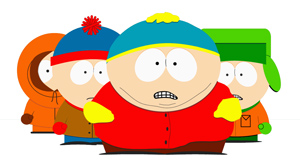
Television Censorship
TV, no doubt because of its ubiquitous presence in the living rooms and bedrooms of the developed world, has always been a battleground between censorship and free speech. When broadcasting resumed after World War 2, censors on both sides of the Atlantic were anxious to keep the airwaves clean. In the US they adopted the Hays Code, which had been so restrictive for the movie studios, and clung to it until the late 1960s.
- A Timeline of TV Censorship - A brief history of the US experience, from Neatorama
- OfCom - the regulatory body responsible for commercial TV, complaints and calls for censorship, in the UK
- Censorship's Tools Du Jour - background paper on American policy from the National Coalition Against Censorship
- The V-Chip
South Park and Censorship

Adult cartoon South Park has highlighted the problems with television censorship ever since it first hit screens back in 1998. The colourful world of sleepy Colorado mountain town, South Park, is created using bold lines, simple two-dimensional shapes and primary colours. It centres around the exploits of four 8 year old boys who go to school, hang out at bus stops and on each others' sofas, and indulge in innocent childhood pastimes like ice-skating. And swearing like total sewer mouths. Creators Trey Parker and Matt Stone use their four unlikely heroes to launch a range of attacks against the sacred cows of popular culture - political correctness, Steven Spielberg, Disney movies, transformer toys, reality TV, Scientology, Jersey Shore, the Sundance Film Festival and of course, censorship, particularly when it applies to the deletion of expletives.
The TV show has been running on cable forover a decade now, and shows no sign of decreasing in popularity. Its themes are invariably adult, invariably funnier than any of the live action sitcoms, and invariably anti-hegemonic. It's possibly the cleverest thing on American TV and regularly confronts the hypocrisy of a nation that sanctions violent murder as entertainment but shies away from naked nipples or the word "shit". However, because its central characters are cartoon 4th graders, they have become very popular with...uh... 4th graders. And parents, much like Kyle's Mom, are perpetually enraged by the content of the show. Comedy Central have not helped matters by producing a whole range of merchandising (lunch boxes, soft toys, keyrings, t-shirts etc) which wasn't exactly aimed at adults.
Stone & Parker deal with the issues head on in the movie (Bigger. Longer. Uncut.) and in many episodes which see the boys left at home with the TV as babysitter while their parents are off campaigning to block any media influence which might "warp their fragile little minds".
In 2010, the show's creators were threatened with a fatwa by a Muslim extremist group after episode 201 featured Mohammed dressed as a bear. Comedy Central censored subsequent broadcasts of that episode and its follow-up out of safety concerns.
- the CAP analysis - "South Park is a movie straight from the smoking pits of Hell"
- The Zen of South Park
- South Park censored after threat of fatwa - includes list of banned or censored episodes at the end of the article.
- Bleeps Be Upon Him - the genius of the censored "Mohammed" episodes (Slate, April 29, 2010)